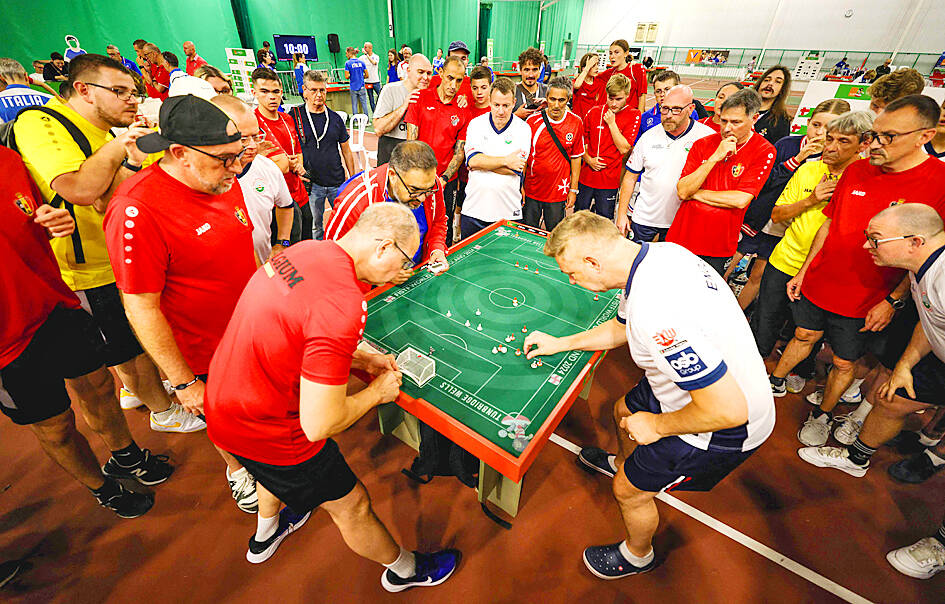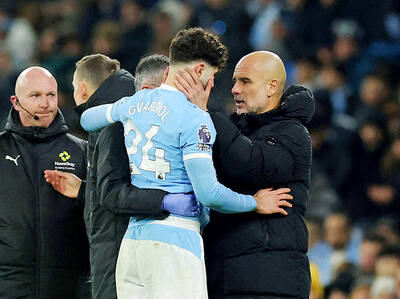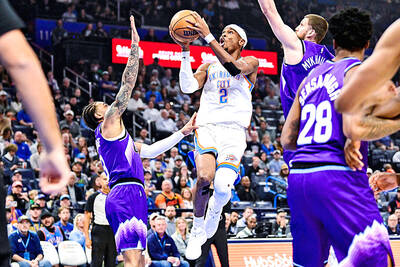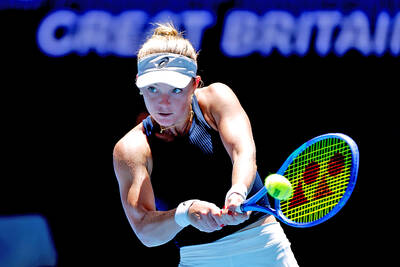With a quivering finger, England Subbuteo veteran Rudi Peterschinigg conceded the free-kick that sent his country’s World Cup quarter-final into extra-time before smashing his plastic goalkeeper on the floor in frustration.
In the genteel southern English town of Tunbridge Wells, 300 elite players have gathered to play the game they love.
“I won’t say this is the best weekend I’ve ever had in my life, but it’s certainly in the top two,” said Hughie Best, 58, who flew in from Perth, Australia, to compete and commentate at the event.

Photo: AFP
Tunbridge Wells is the “spiritual home” of Subbuteo, which was invented there in 1946 before being copied around the world.
The game of skill and strategy fell out of fashion with the advent of computer games, but is undergoing a renaissance among nostalgists and younger players, with this year’s tournament the largest ever.
About 5,000 people visited the three-day tournament’s events, said Stewart Grant, press officer with organizer the English Subbuteo Association, as the town embraced the unusual honor.
“Everybody you speak to, they say it’s the home. It’s a pilgrimage for some people,” he said.
The game’s collectability has always been part of its allure, with many people accumulating the finely painted teams, stands, supporters, floodlights, replica trophies and scoreboards without actually playing.
“It’s quite cool, you can control the ball and the amount of power with your own hands,” spectator and part-time player Harry Brown, 12, said.
“I like how you can paint the players and change the teams,” he added.
England youth player Alex Scott said that he did not play video games because Subbuteo is “a lot more fun.”
“It’s the competitiveness and going around different places meeting new people,” he said.
His father, Justin Scott, runs a club in Wolverhampton, England, and was one of many at the event who said they had noticed an increase in members.
“A lot of people went into their loft and found their Subbuteo” during COVID-19 lockdowns, and “then looked if there was a club when everything reopened,” he said.
The aim of the game is the same as soccer, to score more goals than your opponent. That is achieved by flicking the tiny players, who either have a flat or semicircular base, into the ball and maneuvering it into goal-scoring positions.
The team event knockouts (U-12s, U-16s, U-20s, veterans, women and open) at the climax of the tournament took place around the same time as Sunday’s Premier League match between Manchester City and Arsenal.
However, all eyes in the Tunbridge Wells Sports Centre were on the 50 bright green 90cmx50cm cloth tables.
Before the games, the combatants took their star players out of their ornate wooden boxes, lubricated their bases and set them up in precise formations. After a 10-second countdown, the flick-off began 30 minutes of action.
The team games consist of four simultaneous individual matches, with huge roars punctuating the general buzz of the spectators, indicating where goals were being scored.
Tensions came close to spilling over on occasion, including when England players took off on a victory dash after scoring a goal against the mighty Italians, only to have it controversially ruled out.
That disappointment was forgotten when “super” Bob Varney scored the golden-goal winner in England’s veteran semi-final against Belgium, sparking wild celebrations as he was mobbed by dozens of teammates and spectators.
“Just remember, it’s a children’s board game, recommended age group 7-11. It says it on the box,” Varney joked moments before his goal.
The veteran, cofounder of Drops Cycling — the UK’s most successful women’s cycling team — was playing with a plaster on his finger after sustaining a nasty injury while making a save, later asking lightheartedly that he be described as the “bloodied hero.”
Varney’s team lost in the final to the Italians, who also won the main open event after scoring the winning goal three seconds from the end of their final with Belgium, much to the delight of the team’s wives, families and coaches gathered on the sidelines.
“I don’t know what to say. It was lost, it’s incredible,” World Cup winner Matteo Ciccarelli, 25, said, with sweat pouring from his brow after winning his final match 4-1.

Manchester City have confirmed defender Josko Gvardiol suffered a broken leg in Sunday’s 1-1 draw with Chelsea at the Etihad Stadium. Gvardiol was one of two City centerbacks who went off injured in the second half, along with Ruben Dias, before Enzo Fernandez scored a stoppage-time equalizer for the visitors. The draw left second-placed City six points behind English Premier League leaders Arsenal. City, announcing Gvardiol sustained a tibial fracture to his right leg, added in a statement issued on Monday: “The defender will have surgery later this week and assessment remains ongoing to ascertain the full extent of the

MOTHER KNOWS BEST: Warriors’ coach Kerr said his 91-year-old mother criticized him for his attitude toward officials that led to his ejection from Monday’s game Shai Gilgeous-Alexander on Wednesday rescued the Oklahoma City Thunder with a game-tying buzzer-beater before finishing with 46 points in a 129-125 overtime victory against the Utah Jazz. The reigning NBA champions looked to be heading for a third straight loss after the Jazz inched into a 114-112 lead following Lauri Markkanen’s layup with just three seconds remaining in the fourth quarter. However, NBA Most Valuable Player Gilgeous-Alexander drained a superb 13-foot jump shot to tie it up at 114-114 as the buzzer sounded to send the game into overtime. Gilgeous-Alexander then took over in the extra period with nine points as the Western

Four-time Grand Slam champion Naomi Osaka yesterday got her season off to a winning start for Japan in the United Cup, after the UK’s Emma Raducanu pulled out of their singles clash with a fitness issue, while in Brisbane, Taiwan’s Latisha Chan and Wu Fang-hsien crashed out of the women’s doubles. In Perth, despite Osaka’s win, the UK took the match 2-1 with a deciding mixed doubles victory. Osaka was too strong for reserve and 276th-ranked Katie Swan, winning 7-6 (7/4), 6-1 as Raducanu watched from the sidelines. “I’m proud of how I fought,” Osaka said. “I’d never played here, it was tough.” Britain

Bangladesh will not play their Twenty20 World Cup matches in India after Mustafizur Rahman was released by his Indian Premier League team amid growing tensions between the countries, Bangladesh’s sports adviser Asif Nazrul said on Sunday. Kolkata Knight Riders said on Saturday they had released the Bangladeshi bowler after being told to do so by the Board of Control for Cricket in India (BCCI). Bangladesh are scheduled to play three Twenty20 World Cup matches in Kolkata next month, with the Feb. 7-March 8 tournament being cohosted by India and Sri Lanka. “Bangladesh will not go to India to play the